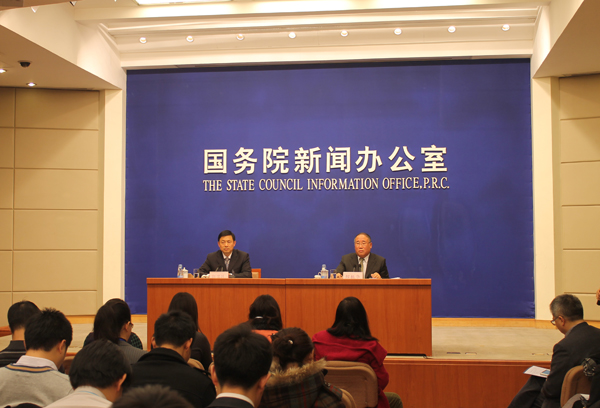China's arduous road to low-carbon development
- By Mi Xingang
 0 Comment(s)
0 Comment(s) Print
Print E-mail China.org.cn, November 22, 2012
E-mail China.org.cn, November 22, 2012
China has made remarkable achievements in the fields of energy saving and emission reduction and is set to remain on the road of low-carbon development, according to a press release regarding a white paper entitled China’s Policies and Actions for Addressing Climate Change (2012) in Beijing on Nov. 20.
During the press conference, Xie Zhenhua, vice-chairman of China’s National Development and Reform Commission, stated that energy consumption intensity in China had dropped 2.1 percent in 2011 and carbon dioxide emission per unit GDP is expected to decrease more than 3.5 percent this year. Additionally, China has strengthened its capabilities in agriculture, forestry, water and marine resources, public health and meteorology in order to adapt to climate change, he said.
 |
|
A press release regarding a white paper entitled China’s Policies and Actions for Addressing Climate Change (2012) was held in Beijing on Nov. 20. [Photo by Mi Xingang] |
The low-carbon pilot projects have covered five provinces and eight cities in China and these areas will continue to expand, Xie Zhenhua said. He specifically pointed out that the pilot programs of carbon emission trading have been initiated across seven municipalities and provinces and that China has set out to explore managing climate change through the market mechanism.
He added that China has enhanced public awareness by extensively addressing climate change and promoting proactive public participation through extensive publicity and coverage, said Xie Zhenhua. China has also compiled the National Plan for Addressing Climate Change (2011-2020) and the Overall National Strategy for Adapting to Climate Change to strengthen the top-level planning of low-carbon development. All these aforementioned actions have facilitated steady and fast economic development in China and demonstrated the Chinese Government’s determination to combat climate change, according to him.
Over the course of the 11th Five-year Plan Period (2006-2010), China’s energy consumption per unit GDP has been reduced by 19.1 percent. Its 12th Five-year Plan illustrates how by 2020, carbon dioxide emission per unit GDP will be reduced by 17 percent and energy consumption per unit GDP by 16 percent as compared to the 2010 figures. Xie Zhenhua stressed that the nation’s government has made a resolution to by 2020 reduce greenhouse gas emissions per-unit GDP by 40-45 percent as compared to the 2005 figures.
Xie Zhenhua also reaffirmed that China faces severe challenges and pressures in combating climate change as it is the world’s largest developing country and has not yet completed its historical mission of industrialization and urbanization. However, China has proceeded on the arduous low-carbon development road by overcoming many difficulties and will unswervingly stick to it, he said.
Xie Zhenhua highlighted the importance of ecological development by quoting Hu Jintao’s recent report to the CPC National Congress as follows, “We must give high priority to making ecological progress and incorporate this into all aspects as well as the overall process of advancing economic, political, cultural, and social progress, and work hard to build a beautiful country, and achieve the lasting and sustainable development of the Chinese nation.”
On a final note, Xie Zhenhua put forward that China will continue to transform its development modes and speed up the restructuring process to make positive contributions to the protection of the world’s climate system with a high sense of responsibility towards the Chinese people and humanity as a whole.






Go to Forum >>0 Comment(s)